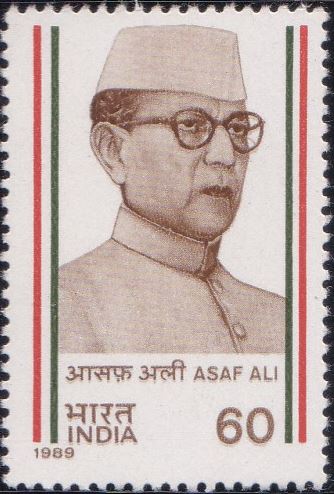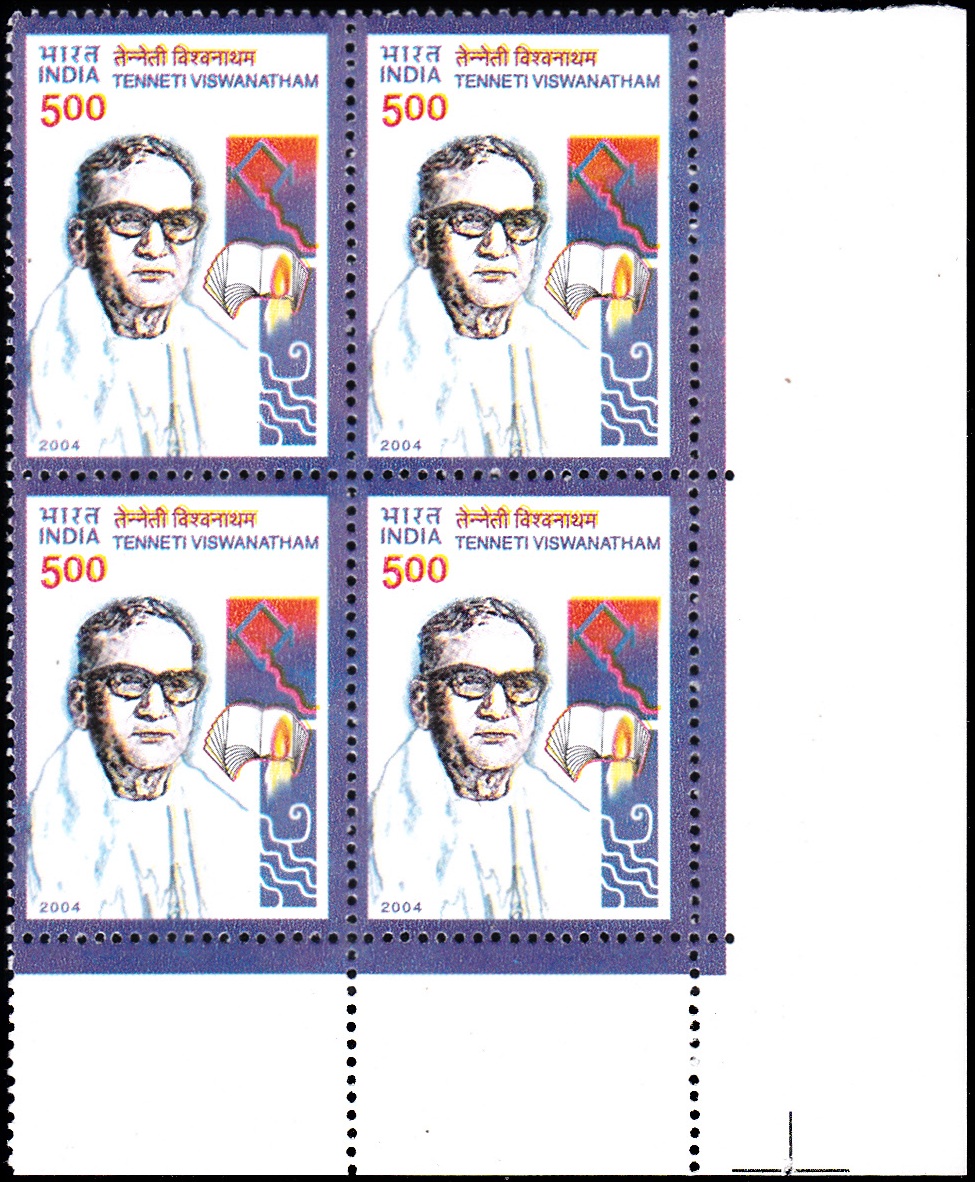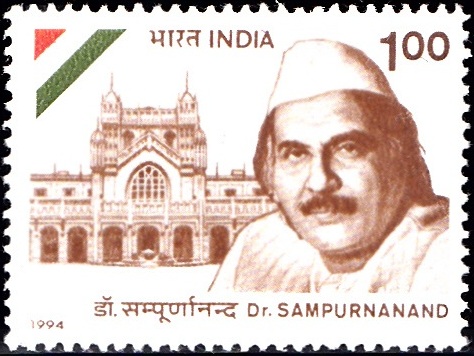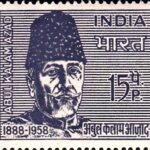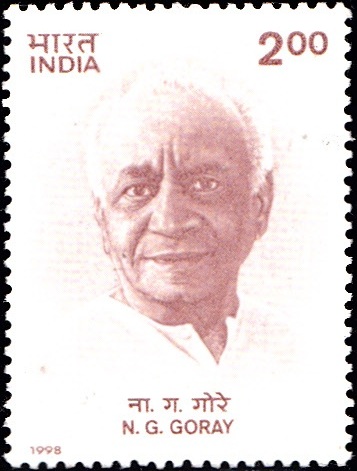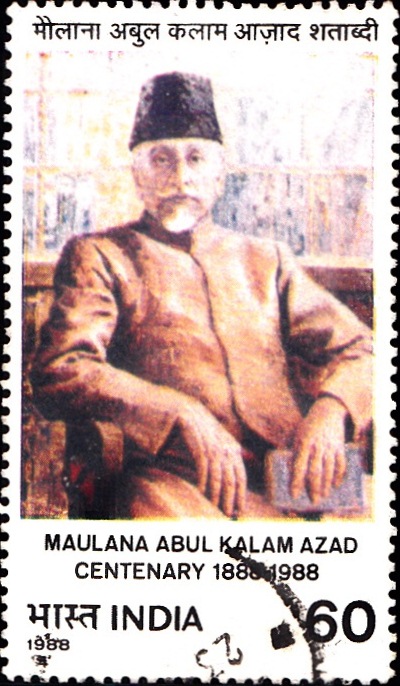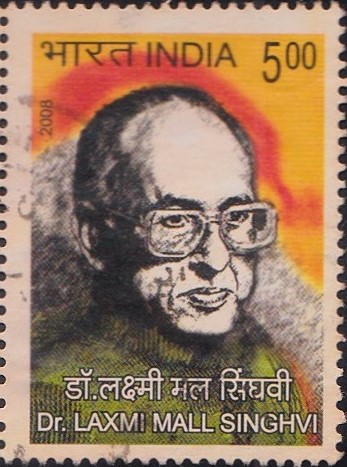
Dr. Laxmi Mall Singhvi
A commemorative postage stamp on Laxmi Mall Singhvi, High Commissioner for India in United Kingdom (1991-97), father of Abhishek Manu Singhvi :

 Issued by India
Issued by India
Issued on Dec 8, 2008
Issued for : Department of Posts is happy to issue a commemorative postage stamp on Dr. Laxmi Mall Singhvi.
Credits :
Stamp & FDC : Bharati Mirchandani
Cancellation : Alka Sharma
Type : Stamp, Postal Used
Colour : Multi colour
Denomination : 500 Paise
Stamps Printed : 0.4 Million
Printing Process : Wet–offset
Printer : Security Printing Press, Hyderabad
Name : Laxmi Mall Singhvi
Born on Nov 9, 1931 at Jodhpur, Rajasthan, India
Died on Oct 6, 2007 at New Delhi, India
About :
- Dr. Laxmi Mall Singhvi was a remarkably multifaceted personality. He was an eminent jurist, renowned constitutional expert, an acclaimed diplomat, a distinguished parliamentarian, a highly respected intellectual, prominent exponent of human rights, a doyen of the Indian Bar, a citizen-statesman, an author, poet, publicist, linguist and a litterateur and, above all, a man of ideas and an institution builder.
- Dr. Singhvi was born on 9 November 1931 in Jodhpur. He was the second son of Sri Dasharath Mal Singhvi, a well known lawyer and freedom fighter from Jodhpur. This “Saraswati Putra” (As a former Prime Minister of India characterized him) was a brilliant student who got scholarships continuously from class six onwards till his Ph.D. He was conferred the “Sahitya Vachaspati” (equivalent to MA) at the unprecedented age of 19. He was a prolific writer and poet from his teens. A gold medalist in BA from Allahabad University and LLB & MA from Jaipur University, he was Rajasthan’s first Rotary Scholar to Harvard University for the LL.M. He did his PhD from Cornell University, USA in a record 2 years and was appointed to the teaching faculty at Berkeley, California. He cut short a promising academic career and returned to India in 1957 at his father’s insistence. Dr. Singhvi held honorary doctorates from the Universities of Rajasthan, Allahabad, Calcutta, Delhi, Osmania, Andhra and Jabalpur.
- He was a leading Senior Advocate of the Supreme Court of India and was President of the apex Court’s Bar Association for four terms. He conceived and founded “Law Day”, now universally observed on November 26 each year throughout the country. Dr. Singhvi’s Report on the Independence of Justice and his Draft Universal Declaration on the Independence of Justice (1978), written as UN Special Rapporteur on the subject, received worldwide acclaim. His Guidelines for the Independence of the Judiciary, are officially known globally as the “Singhvi Principles”. In 1987, Dr. Singhvi was elected Honorary Bencher and Master of the Middle Temple, one of the highest honours in the U.K. Dr. Singhvi was fluent in Sanskrit, could converse in it and had a deep knowledge of India’s scriptures through the ages. Dr. Singhvi has been acknowledged as a spellbinding orator in both Hindi and English.
- Dr. Singhvi was the longest serving High Commissioner for India in the United Kingdom (1991-97). This period was regarded as the golden phase of Indo-British relationship. He established the Nehru Centre in London, now the hub of India’s cultural diplomacy. Several academic courses, chairs of lectures had been established in Dr. Singhvi’s name in different British Universities including Hull, Edinburgh, Wales, London, and Leicester. Dr. L.M. Singhvi Centre for Indian Studies has been established at Hull University and Dr. L.M. Singhvi Foundation has also been established in London with the active patronage and association of the Lord Chancellor, Speaker of the House of Commons, the Lord Chief Justice, the Master of the Rolls and Lord Templeman. In U.K., Dr. Singhvi was conferred Rotary International’s first Ambassador of Excellence award and also the U Thant Peace Award.
- Dr. Singhvi was elected to the Third Lok Sabha as an Independent Member for Jodhpur and became known as an outstanding parliamentarian who held many prominent posts with considerable distinction. As Chairman of the Government of India Committee on Revitalization of Panchayati Raj Institutions, his recommendations and draft amendments have been incorporated into the Constitution by the 73rd Constitutional Amendment. He crusaded for the ombudsman system in India and was the inventor and coiner of the words “Lokpal” and “Lokayukta”.
- Dr. Singhvi was elected Honorary Tagore Law Professor in 1973 at Calcutta University, one of the oldest and most highly regarded Chairs in the world in the field of Law, and was the Founder-President (now Honorary Patron) of the Commonwealth Legal Education Association, London. He was elected as Mahatma Gandhi Professor at Leicester University. Dr. Singhvi was associated with and consulted in the drafting of the constitutions of Bangladesh, Nepal and South Africa.
- He was honoured with the “Padma Bhushan” in January 1998. A quintessential man of ideas and a true Renaissance personality, Dr. Singhvi conceived of the entire diaspora movement, linking India to its children dispersed globally. As Chairman of the Government’s High Powered Committee, Dr. Singhvi conceived, delivered and promoted the nascent movement after his seminal and comprehensive Report on the subject. He was Chairman, Pravasi Bharatiya Divas 2003 and 2004. On his recommendation, the Government of India announced January 9 as Pravasi Divas and started honouring NRIs and PIOs with the “Pravasi Bharatiya Samman Award”.
- Dr. Singhvi was Co-Chairman of Bharatiya Vidya Bhavan International and Chairman of Pravara Mandals for Jamna Lal Bajaj and JnanPeeth Awards. The Bajaj Award is the highest Award for Gandhian work and the JnanPeeth Award is India‘s equivalent of the Nobel Prize for literature.
- Dr. Singhvi was Leader for the Indian Delegation at the UN Human Rights Conference at Vienna in 1993. In February-March 1998, he was the Leader of the Indian Delegation to the biggest ever inter-governmental conference on Culture and Development in Stockholm. Dr. Singhvi‘s pioneering and dedicated work for inter-faith amity has been acknowledged throughout the world. In 1994 he was presented with the Inter Faith Gold Medallion at the Lambeth Palace by the Archbishop of Canterbury on behalf of the International Council of Christians and Jews. Dr. Singhvi was in an acknowledged exponent of the inter-faith movement and was elected as one of the Presidents of the Centennial Parliament of World’s Religions held at Chicago in 1993 at which he delivered the keynote address.
- Dr. Singhvi was also elected in 1992 to the Rede Chair at Cambridge University, an over 500 year old extremely prestigious position at that University. He was also invited to plant a tree at the New Law Library at Cambridge University. Dr. Singhvi served as a Member of the UNESCO‘s Executive Board (2002-2005). He was Founder President of Institute of Constitutional and Parliamentary Studies (ICPS) in the early 1960s and President of Indira Gandhi National Centre for Arts (2000-05). He remained President of the Authors Guild of India for over a decade.
- Dr. L.M. Singhvi‘s wealth in friendships is his true legacy. Dynamic in personality, quiet in demeanour, austere in habits, unostentatious in behaviour, just in decision, prompt in action, simple in dress and empathetic in his dealings – these were the hallmarks of his personality. He is a vibrant symbol and everlasting emblem of the age old Indian intellect, culture and civilization.
- Text : Based on material supplied by the proponent.
Subscribe
Login
0 Comments


